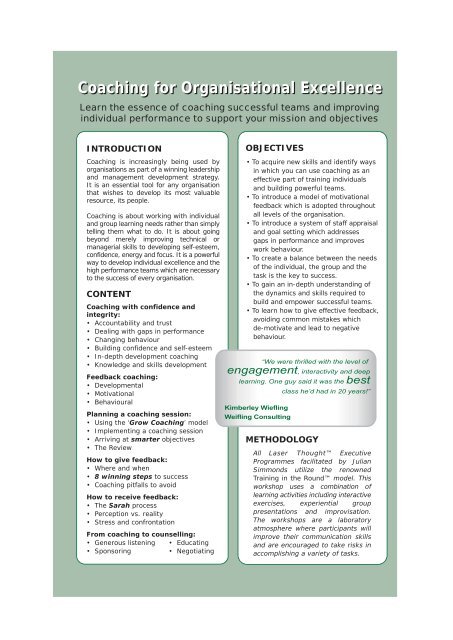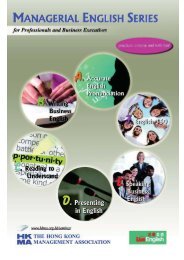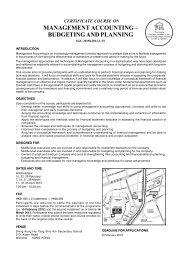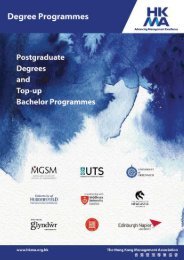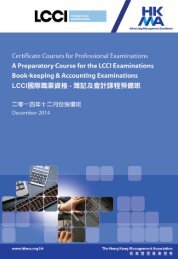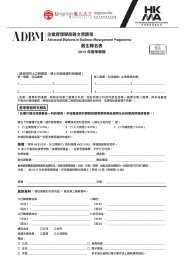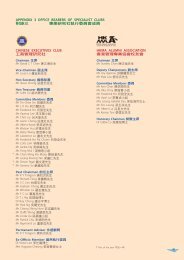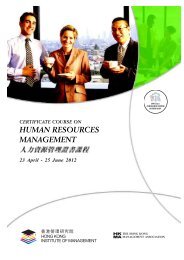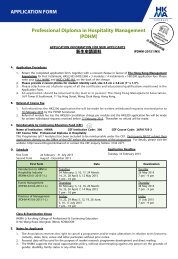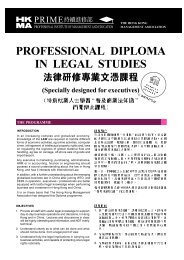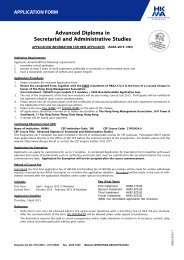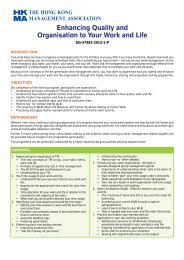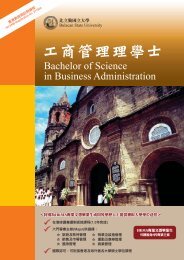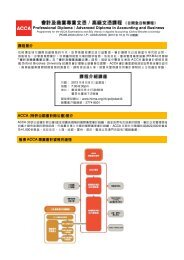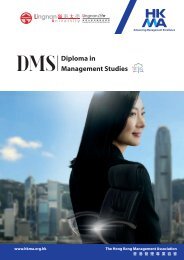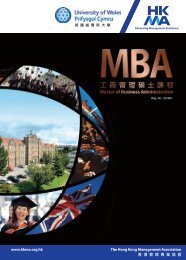executive leadership programmes - Hong Kong Management ...
executive leadership programmes - Hong Kong Management ...
executive leadership programmes - Hong Kong Management ...
You also want an ePaper? Increase the reach of your titles
YUMPU automatically turns print PDFs into web optimized ePapers that Google loves.
Coaching for Organisational Excellence<br />
Learn the essence of coaching successful teams and improving<br />
individual performance to support your mission and objectives<br />
INTRODUCTION<br />
Coaching is increasingly being used by<br />
organisations as part of a winning <strong>leadership</strong><br />
and management development strategy.<br />
It is an essential tool for any organisation<br />
that wishes to develop its most valuable<br />
resource, its people.<br />
Coaching is about working with individual<br />
and group learning needs rather than simply<br />
telling them what to do. It is about going<br />
beyond merely improving technical or<br />
managerial skills to developing self-esteem,<br />
confidence, energy and focus. It is a powerful<br />
way to develop individual excellence and the<br />
high performance teams which are necessary<br />
to the success of every organisation.<br />
CONTENT<br />
Coaching with confidence and<br />
integrity:<br />
• Accountability and trust<br />
• Dealing with gaps in performance<br />
• Changing behaviour<br />
• Building confidence and self-esteem<br />
• In-depth development coaching<br />
• Knowledge and skills development<br />
Feedback coaching:<br />
• Developmental<br />
• Motivational<br />
• Behavioural<br />
Planning a coaching session:<br />
• Using the ‘Grow Coaching’ model<br />
• Implementing a coaching session<br />
• Arriving at smarter objectives<br />
• The Review<br />
How to give feedback:<br />
• Where and when<br />
• 8 winning steps to success<br />
• Coaching pitfalls to avoid<br />
How to receive feedback:<br />
• The Sarah process<br />
• Perception vs. reality<br />
• Stress and confrontation<br />
From coaching to counselling:<br />
• Generous listening • Educating<br />
• Sponsoring<br />
• Negotiating<br />
OBJECTIVES<br />
• To acquire new skills and identify ways<br />
in which you can use coaching as an<br />
effective part of training individuals<br />
and building powerful teams.<br />
• To introduce a model of motivational<br />
feedback which is adopted throughout<br />
all levels of the organisation.<br />
• To introduce a system of staff appraisal<br />
and goal setting which addresses<br />
gaps in performance and improves<br />
work behaviour.<br />
• To create a balance between the needs<br />
of the individual, the group and the<br />
task is the key to success.<br />
• To gain an in-depth understanding of<br />
the dynamics and skills required to<br />
build and empower successful teams.<br />
• To learn how to give effective feedback,<br />
avoiding common mistakes which<br />
de-motivate and lead to negative<br />
behaviour.<br />
“We were thrilled with the level of<br />
engagement, interactivity and deep<br />
learning. One guy said it was the best<br />
Kimberley Wiefling<br />
Weifling Consulting<br />
class he’d had in 20 years!”<br />
METHODOLOGY<br />
All Laser Thought Executive<br />
Programmes facilitated by Julian<br />
Simmonds utilize the renowned<br />
Training in the Round model. This<br />
workshop uses a combination of<br />
learning activities including interactive<br />
exercises, experiential group<br />
presentations and improvisation.<br />
The workshops are a laboratory<br />
atmosphere where participants will<br />
improve their communication skills<br />
and are encouraged to take risks in<br />
accomplishing a variety of tasks.


